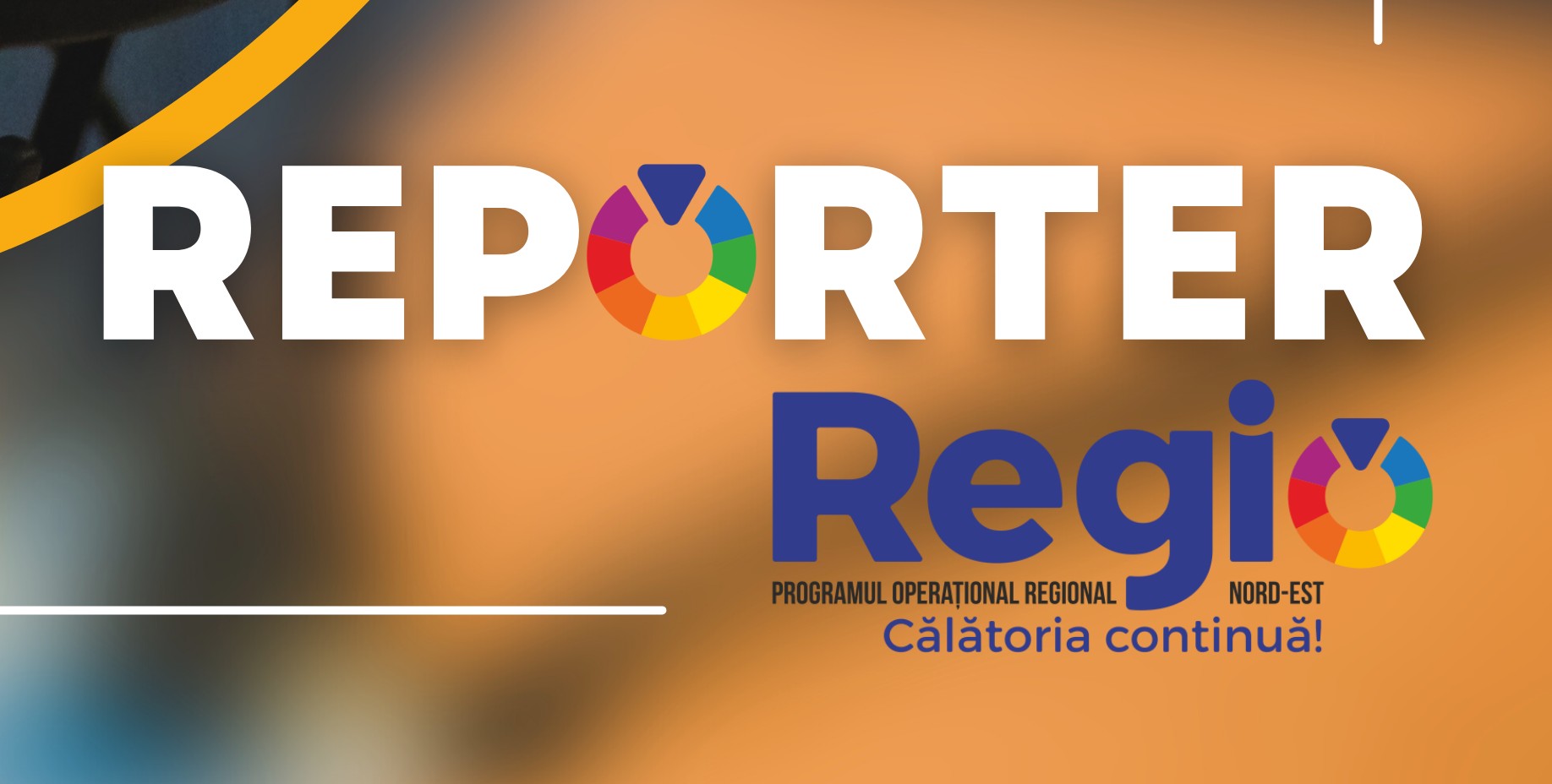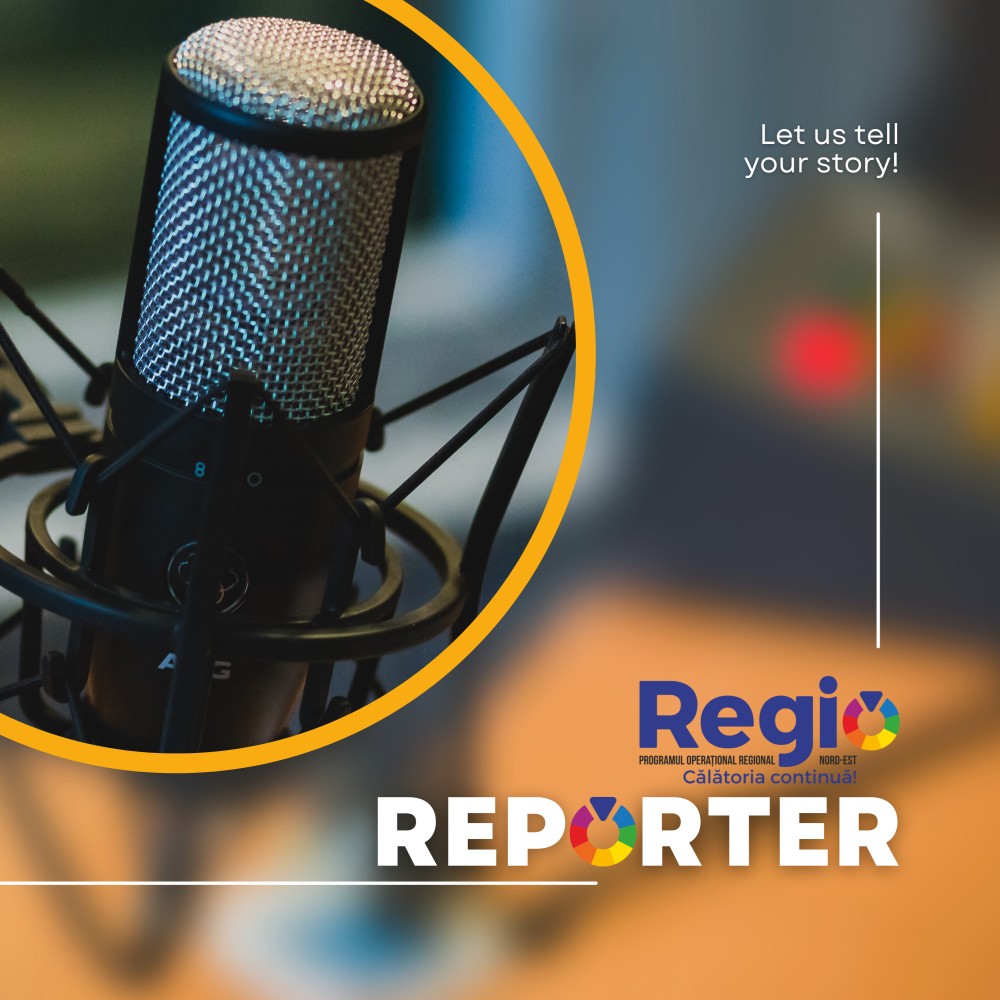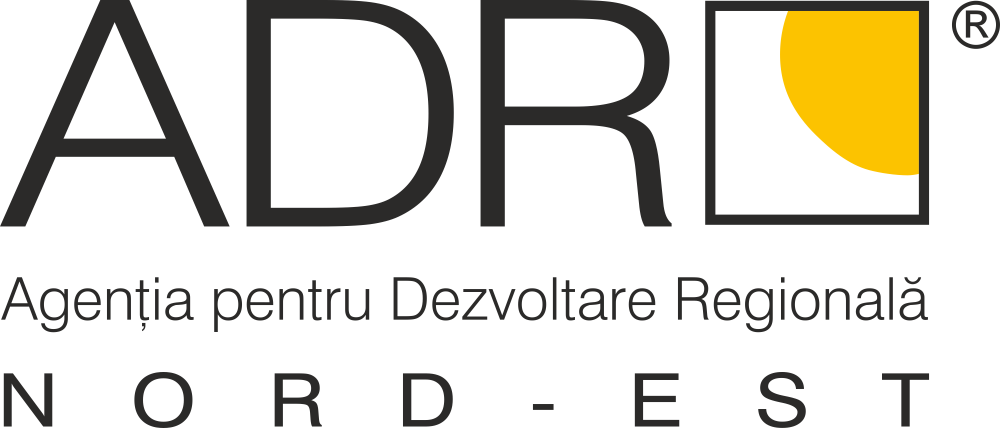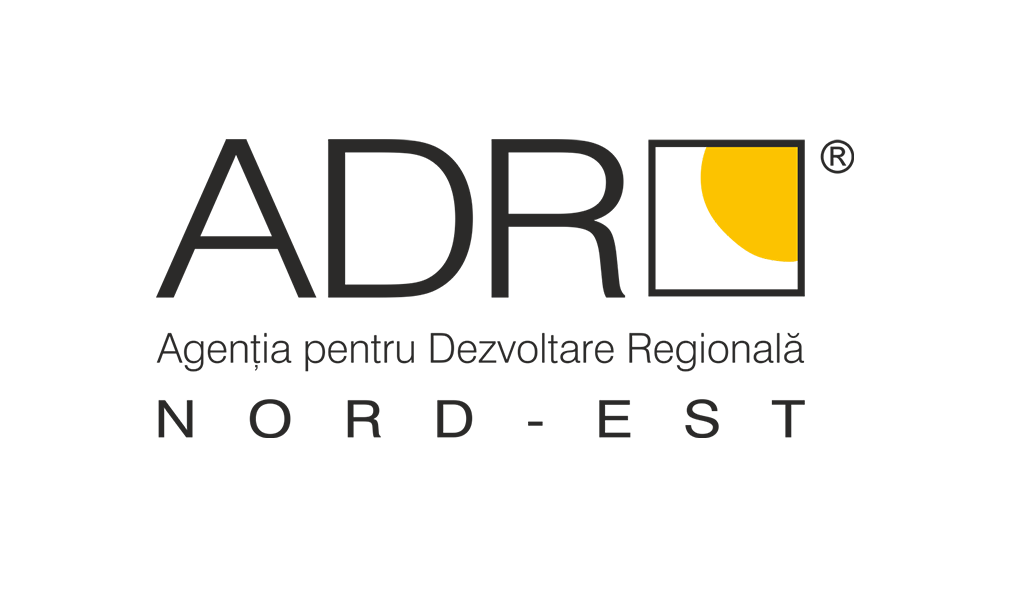Reporter REGIO: episode 20
How to successfully embroider in a workshop in Bârlad, with Regio support
Success stories, possible with the support of Regio Nord-Est 2014-2020

They started from scratch, with a bank loan and the desire to provide a better life for their children. They learned to tailor, embroider, and start a business in which they had no prior training. Time proved that they made the right choices, and the turnover of 280k euros in 2022 is just a consequence of those choices. They claim that the funds obtained from the 2014-2020 Regional Operational Program (POR) for high-performance equipment, worth 200k euros, with which they equipped their workshop, „forced” them to grow in times when they didn’t believe they could. The Cărare spouses from Bârlad city are proof that if you want, you can, regardless of obstacles.
In 2006, they realized that they wanted more, especially with the birth of their first child. He, a policeman, and she, a pharmacy assistant, wanted an extra income that would allow them to go on vacation without destabilizing the family budget. They started a business, but little did they know that their journey into the entrepreneurial world would be a roller coaster. The story of the Cărare spouses is an example that you can grow a business step by step, you can get European funds, and you can succeed with products designed and tailored by yourself.

Clothing store and workshop
The first step into entrepreneurship for Mihaela and Constantin Cărare was in the retail sector: a clothing and footwear store with products made in Romania. They took out a bank loan and established an exclusive store in Bârlad that had contracts for selling only with Romanian manufacturers. Mihaela continued her job at the pharmacy for another two years, but because the store was stagnating and she couldn’t get involved as she wanted to grow it, she gave up the pharmacy and dedicated herself entirely to the store. It was an economic boom period when everyone was buying everything. Since people needed clothes alterations, the Cărare spouses began to collaborate with a seamstress to make these small modifications. Gradually, this collaboration turned into a full-time job and the opening of a tailoring workshop. They equipped the workshop with what they had at home: an ironing table, an iron, and a used sewing machine. They knew nothing about this field, but they followed their intuition.
Partnership with Belgium
Everyone was buying everything until… they stopped buying. The financial crisis came, and business declined. The Cărare spouses had to give up the store and continue only with the clothes modifications workshop. „It was very, very hard for us. We supported the business from my husband’s salary. When he received his salary, we paid the employees first, and we lived on the few clothes alterations that were made,” Mihaela recalls. Until… Dominique contacted them. A young Belgian with a belief in an idea: custom-shaped tablecloths made of eco-leather. Coincidentally (or destiny), a friend from childhood of the two spouses, a man from Bârlad, was selling caramelized apples on a stick at a fair in Belgium, and Dominique had his stand right in front of him. Hearing that he was from Romania, Dominique asked if he knew anyone with a garment workshop who could make a product on demand. He knew and had a place to sell, but he didn’t have a producer. The quantities he wanted to make couldn’t be sourced from China or India, so he contacted Mihaela.
This young man told Mihaela that he would come to Romania just to talk. „I said that if he came all the way from Belgium, I might as well make him a product. I bought some materials from a nearby store, whatever I found, a shiny material. I made some samples. They turned out so ugly. But it didn’t matter to him. He was satisfied that someone was listening to him. He was younger than me, full of energy, with an eco-leather apron in hand, and he said that he wanted to sell something like that. It wasn’t even his concept; he took it from somewhere,” Mihaela recounts, laughing.



Long-term business
Then Dominique told them about his long-term business plan. His business concept was to sell Horeca items to big clients in the industry. But what distinguished his idea from other sellers was that if a client wanted to buy the same apron from him after 5 years because one in the restaurant had worn out, the client would have the guarantee that he would find it. The idea was very good, but Mihaela and Constantin couldn’t guarantee that they would find the same materials after 5 years. The Belgians had a development plan; they knew what they wanted. The Cărare spouses had no plan at all; they were living from month to month. But they never admitted that. They went into negotiations on an equal footing, even though they didn’t know what price to ask for. Dominique left Romania with the idea of finding some distributors, and Mihaela stayed to make some samples. „I was taking my child to school one morning, and I heard a radio advertisement for the furniture fair at Romexpo. I thought that surely at a furniture fair, those who sell raw materials for sofas would also come, right? Honestly, we didn’t have the money for fuel to go to Bucharest. So, we asked them for money. We told them that I would go on my own time, not because we didn’t have money and time costs,” Mihaela recalls. They went to Romexpo with 100 euros sent by Dominique and his company, and they found a Polish supplier with whom they still work today. „I asked him if I needed the same eco-leather in exactly 10 years, did he have it? He said: sure! He asked me what we wanted to do with the material. Tablecloths. He told us that he had never encountered such a thing, as they usually make sofas. In the end, we sent the sample to the Belgian; he was very satisfied, and that’s where the madness began,” Mihaela says.
The need for high-performance equipment
Mihaela remembers how difficult it was to sew that eco-leather because they didn’t have a sewing machine specifically for leather. To make the needle slide on the material, she would wet it with a piece of cotton soaked in water. „I worked very hard. I didn’t think I could make them. But I had to make them. The plans he told me were our chance to succeed. We had the availability to work, and he wanted to do something different on the market. He wanted something personalized, embroidery on that specific product. I knew someone in Bârlad who had an embroidery machine. We made some samples. I remember that at that time, 10 years ago, he asked me 40 cents for an embroidery that we now do for 17 cents,” Mihaela recounts.
They eagerly wanted an embroidery machine
They started making embroidery samples, and the Belgian partner presented them to clients. All clients had their own logo that they wanted to personalize. Mihaela remembers that there were orders where the embroidery part was more expensive than the labor. Even though she cut, sewed, packaged, and sent them, they decided that they wanted an embroidery machine and would do everything possible to buy one.
That’s when the idea of a project with European funding sprouted. The external provider they had for embroidery started delaying delivery times, and the Cărare spouses couldn’t afford this. They differentiated themselves in the market precisely because of short delivery times, between 5 and 10 days. Then the Belgian partner company suggested the idea of buying an embroidery machine. In the end, because it was very expensive, around 60-80 thousand euros, and the depreciation period was long, they decided not to invest. „That’s when we said we would buy an embroidery machine ourselves. With credit, with whatever. We had no idea what an embroidery machine meant; I had just learned what a sewing machine was. We turned to Start-Up Nation at that time. We didn’t qualify because of the wrong information provided by the consultant. They realized they were wrong and refunded our money. But we were still looking for available funds,” Constantin recalls.
96 points
During all this time, they continued to grow. They bought two special machines for cutting leather, a high-performance ironing table, and other used equipment. They were developing. At some point, they moved to another rented space and expanded from 140 square meters to 250. From cutting piece by piece on the floor to a cutting table, from laying the fabric roll on the floor and kneeling to cut, to sufficient space for maneuvering. „The ground floor was okay; the upstairs was red. We renovated the building to rent it. We said, okay, we have a half-empty building, a desire to develop, some loans. Let’s see how we can get that embroidery machine. We needed to get more money from somewhere. We discussed with someone; that his job was just to see if and what chance a project had for funding. He told us from the start that the consultancy firm doesn’t take projects that don’t have a chance. After a few calculations, he told us that we would get around 96 points. And that’s exactly what we got,” Constantin Cărare recounts.

Funding from POR and reverse psychology
They knew that the funding was 200 thousand euros, and the co-financing part was 30%. Financially, they were fine on paper, the turnover was okay, and they qualified for a loan for co-financing. Buuut… then came the pandemic. The project was approved in 2020, amid lockdown. „We were here, in the workshop, making masks when we received the news. We didn’t know whether to be happy or sad. It was a time when everything was closed. The Horeca sector was on the ground. We wondered how much money we had lost until then and if it was worth going further. It was an accepted project, so we had to spend money on consultancy. A lot. But how could we if we had no source because everything was closed? Nothing was left of what we had originally thought,” Mihaela recalls.
The Cărare spouses had planned a complete line of textile products; all the equipment that was supposed to come through the project was meticulously arranged in their plan. They had the schematics drawn on the walls. Meanwhile, they also developed the concept of personalized aprons, clothing items for the Horeca industry, bread baskets, and knife holders; the range had considerably diversified. „The initial idea was from the Belgian, but what developed afterward was thanks to Mihaela. She thought of every detail,” says Constantin proudly.
When they finished the wish list with equipment and sent it to the consulting firm, they were told that it was not enough; they needed an additional 80 thousand euros worth of equipment. The 200 thousand euros they knew about were the 70% of the project. From 60 thousand co-financing, they had now reached 80 thousand, and they no longer fit into the loan. It was exactly the amount the embroidery machine initially cost. All their plans were now turned upside down. And because they couldn’t take the money back, they preferred to think that they would buy the embroidery machine in installments. And the rest of the equipment would be a bonus. This thought helped them psychologically. They had no support from anyone. Everyone was locked at home, and they were getting equipment worth 280 thousand euros to make products for the Horeca sector. „Our partners in Belgium couldn’t help us. No one could. The madness had begun. It was said that we would no longer be allowed to sell bread baskets, that everything had to be hygienic, and that there would no longer be menus on the table so that they wouldn’t be touched by many people. No matter how you turned it, it was all bad. But we went ahead,” Mihaela says.

Now, in 2023, at the end of the project, all the equipment is being used and adds value to the company. One person, thanks to the equipment, does the work of three people. Precision is millimetric, without human errors. The business is developing and starting to penetrate the Romanian market more and more. They even obtained an ISO certification for the development of the apron. „When we go somewhere, I take the bag with samples with me. You never know who I might talk to. We learned a lot from our Belgian partners. They stood by us at the international fair we attended; they were like a quality guarantee. Now that we know the course of a project with European funding, we can’t wait for the next one,” says Constantin.”

Reporter REGIO is a new North-East RDA initiative, which focuses on promoting the successful projects of our beneficiaries, projects that have managed to stand out by bringing added value and impact to the community. At a time when negative news predominates, we offer you beautiful but true stories for reading, meant to strengthen the belief that „it is possible”! Be part of the story!
Are you a Regio beneficiary? Let us tell you the story.
Contact us for details at info@adrnordest.ro


 INTERES PUBLIC
INTERES PUBLIC

